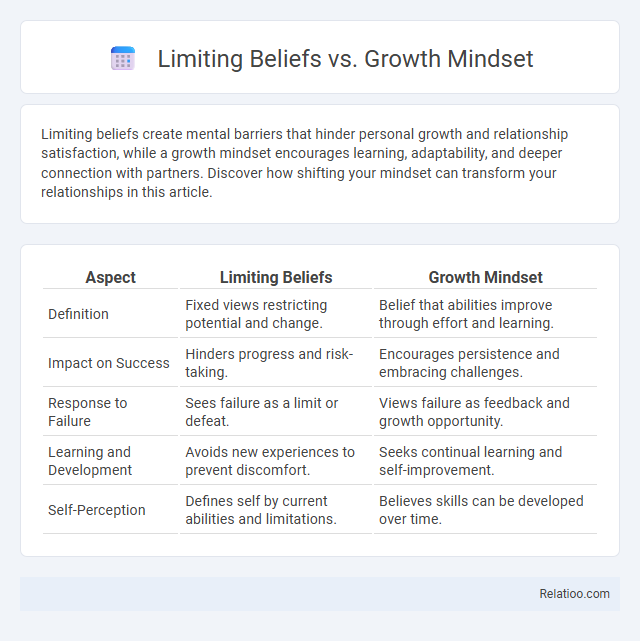Limiting beliefs create mental barriers that hinder personal growth and relationship satisfaction, while a growth mindset encourages learning, adaptability, and deeper connection with partners. Discover how shifting your mindset can transform your relationships in this article.
Table of Comparison
| Aspect | Limiting Beliefs | Growth Mindset |
|---|---|---|
| Definition | Fixed views restricting potential and change. | Belief that abilities improve through effort and learning. |
| Impact on Success | Hinders progress and risk-taking. | Encourages persistence and embracing challenges. |
| Response to Failure | Sees failure as a limit or defeat. | Views failure as feedback and growth opportunity. |
| Learning and Development | Avoids new experiences to prevent discomfort. | Seeks continual learning and self-improvement. |
| Self-Perception | Defines self by current abilities and limitations. | Believes skills can be developed over time. |
Understanding Limiting Beliefs
Limiting beliefs are deeply ingrained thoughts that restrict your potential by creating mental barriers based on fear, doubt, or past experiences. Understanding these beliefs is essential because they often sabotage your growth mindset, which thrives on embracing challenges and learning from failures. Identifying and challenging these negative thought patterns enables you to replace them with empowering perspectives that fuel personal and professional development.
What is a Growth Mindset?
A growth mindset is the belief that abilities and intelligence can be developed through dedication, effort, and learning from failures. Unlike limiting beliefs that restrict your potential and sabotage progress, a growth mindset encourages resilience, open-mindedness, and continuous self-improvement. Embracing this mindset transforms challenges into opportunities for your personal and professional growth.
Origins of Limiting Beliefs
Limiting beliefs often originate from early life experiences, cultural conditioning, and repeated negative feedback that shape your self-perception and potential. These beliefs create mental barriers that hinder a growth mindset, which thrives on resilience, learning, and embracing challenges. Recognizing the origins of these limiting beliefs is essential to dismantle sabotage patterns and unlock your true capabilities.
Growth Mindset: Core Principles
Growth mindset centers on the belief that abilities and intelligence can be developed through effort, learning, and persistence, contrasting with limiting beliefs that restrict potential by assuming fixed traits. Core principles include embracing challenges, learning from criticism, and valuing effort as a path to mastery. This mindset reduces self-sabotage by promoting resilience and a focus on continuous improvement rather than fear of failure.
Impact of Limiting Beliefs on Success
Limiting beliefs create psychological barriers that hinder personal and professional success by restricting one's perception of potential and ability. These negative thought patterns reduce motivation, increase self-doubt, and lead to self-sabotage, preventing individuals from taking risks and embracing growth opportunities. Cultivating a growth mindset counteracts limiting beliefs by encouraging resilience, learning from failure, and fostering a proactive approach to challenges.
Growth Mindset and Personal Development
A growth mindset fosters resilience and continuous learning by encouraging individuals to embrace challenges and view failures as opportunities for growth. Personal development thrives when limiting beliefs, such as fear of failure or self-doubt, are replaced with positive affirmations and proactive behaviors that enhance skills and confidence. Overcoming self-sabotage requires conscious awareness and intentional efforts to reframe negative thought patterns, leading to sustained progress and achievement.
Common Examples of Limiting Beliefs
Common examples of limiting beliefs include thoughts like "I'm not good enough," "I don't deserve success," and "Failure means I'm a failure," which hinder your personal and professional growth. These negative beliefs create mental barriers that prevent you from adopting a growth mindset, which encourages learning, resilience, and embracing challenges. Recognizing and challenging these self-sabotaging thoughts is essential to shifting toward a mindset that supports continuous improvement and achievement.
Strategies to Overcome Limiting Beliefs
Overcoming limiting beliefs requires identifying deeply ingrained negative thoughts that hinder personal growth and replacing them with empowering, growth-oriented perspectives. You can challenge these beliefs by practicing self-awareness, reframing failures as learning opportunities, and setting realistic, incremental goals to build confidence. Consistent use of positive affirmations and seeking support from mentors or coaches also effectively dismantle self-sabotage patterns, promoting a sustainable growth mindset for success.
Cultivating a Growth Mindset: Practical Tips
Limiting beliefs restrict your potential by creating mental barriers that prevent you from embracing challenges and learning opportunities. Cultivating a growth mindset involves recognizing these self-imposed limits and replacing them with positive affirmations, persistent effort, and a focus on progress rather than perfection. Practical tips include setting realistic goals, seeking constructive feedback, and reframing failures as valuable lessons to overcome self-sabotage and foster continuous personal growth.
Choosing Growth: Transforming Limiting Beliefs
Choosing growth involves identifying and challenging limiting beliefs that hinder personal development. Embracing a growth mindset fosters resilience, encourages learning from failure, and combats self-sabotage behaviors that arise from fear or doubt. Transforming these mental barriers empowers individuals to unlock their full potential and achieve sustained success.

Infographic: Limiting Beliefs vs Growth Mindset
 relatioo.com
relatioo.com